The complete playbook on how to start a digital marketing agency
The path to creating your own digital marketing agency is just around the corner.

In this all-encompassing guide, you’ll find insight into:
- The importance of digital marketing agencies in today’s business landscape
- The potential benefits of starting a digital marketing agency within an evolving landscape and advances in AI integration.
- The profitability of digital marketing agencies, including diverse client opportunities and scalable business models
- A comprehensive 10-step guide to starting a digital marketing agency and setting a solid foundation for success in the digital marketing industry

![]() INTRODUCTION
INTRODUCTION
Endless types of marketing agencies are in high demand right now—there’s a lot of money to be made, and on top of that, it gives agency owners the creative freedom to run their very own entrepreneurial ventures. There are countless benefits just waiting to be discovered, and this article goes step-by-step through how to start a digital marketing agency (the right way) in 2024.
![]() SECTION ONE
SECTION ONE
What is a digital marketing agency?
A digital marketing agency is a company dedicated to assisting businesses in promoting their products or services through a myriad of online channels, such as Facebook posts or email campaigns. These agencies play a key role in shaping and amplifying their client’s online presence, strategically crafting campaigns that resonate with their target audience.
How do digital marketing agencies help businesses?
This year, 667.6 billion dollars are expected to be spent on digital advertising worldwide—a 10.9% jump from 2023 (Oberlo). This number shouldn’t come as a shock, as more businesses are starting to realize the need for a strong digital marketing strategy to succeed. As a result, the need for digital agencies has skyrocketed.
Generate online success and revenue
Digital marketing agencies offer various services designed to improve a business’s visibility and influence across one or more marketing channels. While offering marketing agency services is great and all (we need services to promote businesses online), what’s more important for marketing agencies is that they act as collaborative partners.
When you’re a digital agency startup, your value and what sets you apart from other agencies come from understanding the identity and needs of each one of your clients.
The most successful digital marketing agencies use their expertise to craft campaigns that perfectly align with their client’s unique goals and aspirations. Think about it, your customers don’t want likes and shares—they want more revenue every month. If you can help them achieve this through your efforts, you are adding value that will keep them coming back.
Also see: Common Marketing Agency Structures to Build an Organizational Blueprint
Offer a diverse service portfolio
The best digital marketing agencies offer a diverse range of services that cover every area of online marketing, including things like:
- Search engine optimization (SEO): for enhanced visibility on search engines.
- Pay-per-click (PPC): paid advertising for targeted reach.
- Social media marketing: for engagement.
- Content marketing: for storytelling.
- Email marketing: for direct communication.
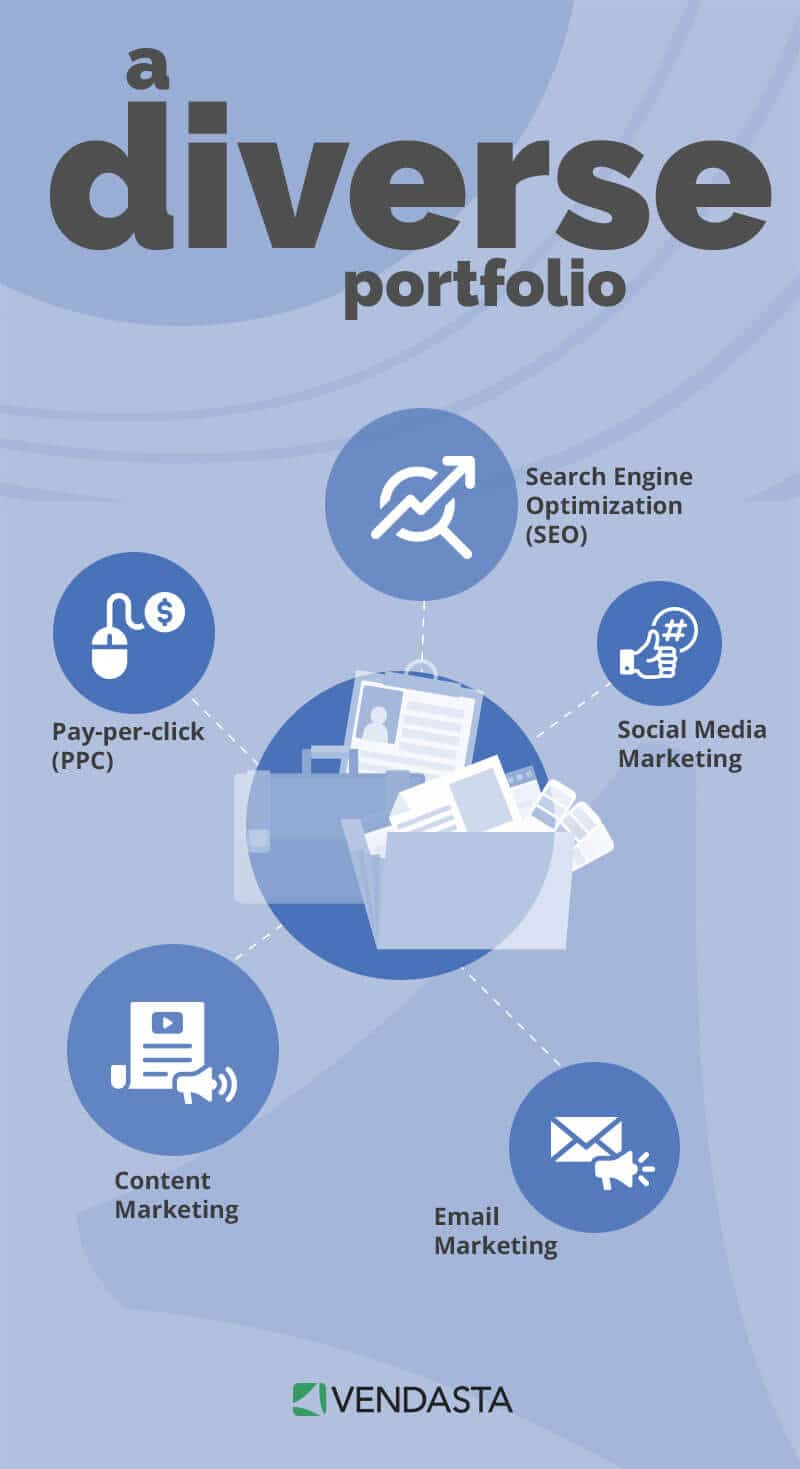
Each service is a piece of a larger puzzle, collectively contributing to a holistic digital marketing agency strategy that better resonates with the target audience.
Also see: 7 Essential Digital Marketing Resources to Empower Your Agency
Determine your digital marketing agency’s ultimate goal
The primary objective of a digital marketing agency is to expand a business’s reach and propel it toward success. Successful digital marketing agencies increase brand visibility, drive traffic to websites, and generate valuable leads that convert into sales for their clients.
Overall, your goal as an agency owner is to catalyze growth, usher your digital marketing clients into a new stage of maturation and success.
Also see: Digital agency goes from start-up to $250,000 in annual revenue

Why businesses need digital marketing agencies
Everything is digital—enough said. From how we connect with friends to how we shop, if businesses want to stay in the game, they need to be where their customers are. But just being online isn’t enough—they need to stand out, and that’s where your agency skill set comes in.
Connecting with the right people
Digital marketing agencies help businesses discover who their customers are and how to reach them online. Realistically, it’s about connecting with the right people—typically, those most likely to be interested in what they offer. This targeted approach saves the business (and you!) time and money while maximizing impact.
Boosting visibility
Just because you create a website doesn’t mean people will know it’s there—or feel compelled to visit. But that doesn’t mean you can’t drive traffic to your new website.
You see, digital marketing agencies use tricks of the trade, like optimizing websites for search engines (SEO) and creating engaging content, to make sure a business pops up when people search for related content. This can greatly boost visibility and finally put a business on the map.
Driving sales
Digital marketing agencies create strategies that guide potential customers from browsers into buyers. Whether it’s through a catchy ad, a well-optimized website, or a strong social media presence, the goal is to drive real, measurable results.
You’re there to help a local business adapt to how people live and shop today. So, in a nutshell, partnering with a digital marketing agency isn’t just a nice-to-have—it’s a smart move for the future of their business.
Building an agency to compete in the local business experience economy (Guide)
![]() SECTION TWO
SECTION TWO
Reasons to start a digital marketing agency
Still on the fence about starting a digital marketing agency? Here are some strong arguments why taking the plunge might just be the perfect move for you:
Potential for higher profitability and scalability
One of the major perks of launching a digital marketing agency is just how profitable it is. With over 667 billion dollars anticipated to be spent by businesses on digital advertising alone, there is money to be made here (EMarketer). Businesses are also allocating significant budgets to online marketing and advertising to stay ahead of their competitors, with a study showcasing averages near 13% in 2022 and a growth of nearly 8% by the end of 2023 (Statista). As a savvy entrepreneur, tapping into this growing demand can translate into a lucrative opportunity.
Moreover, digital marketing services often have scalable business models, allowing for expansion without a proportional increase in startup costs. This scalability factor can lead to major long-term gains.
Take advantage of the increasing demand
In a survey from fall 2023, top marketing bosses in the US shared that they spent almost 8% more on digital ads compared to the year before. Meanwhile, spending on old-school ads dropped by 0.6% (Statista).
Spending on traditional ads is going down, while digital ad spending is going up. And one thing’s for sure—as the popularity of mobile increases, US marketing managers are putting more and more money into mobile marketing as well (Statista).
Businesses are actively seeking digital marketing professionals who can navigate the changes and nuances of the industry, creating a favorable environment for your agency to thrive. That’s why a digital marketing agency positions you as a valuable expert in an industry where your skills are in high demand.
Diverse clientele and continuous learning
With trends and technology constantly changing how we do things, such as the increasing adoption of machine learning and AI for optimizing performance, digital marketing offers a unique opportunity to work with diverse clients (Forbes). From tech startups to local businesses, each client brings their own challenges and opportunities.
This diversity makes the work more interesting and keeps you on your toes. Staying on top of the latest trends, tools, and strategies becomes a routine part of the job, ensuring that you and your team are always ahead of the pack.
Flexibility and entrepreneurial freedom
If you’re tired of bigwigs telling you what to do, guess what? You can now call the shots. As a digital agency owner, you can shape your agency’s culture, choose the projects you want to work on, and build a team that aligns with your vision. This autonomy allows you to adapt quickly to industry changes, innovate in your approach, and create a business that reflects your values and aspirations.
At the heart of it, starting a digital marketing agency isn’t a career move—it’s finding your calling. It’s a journey with the potential for financial success, professional growth, and the satisfaction of helping businesses in their time of need. If you’re passionate about marketing, technology, and making a real impact, launching your own digital marketing agency could be the exciting journey you’ve been waiting for.
Grow monthly recurring revenue selling software under your own brand
Discover a new way to grow with the only end-to-end ecommerce platform for selling digital solutions to local businesses.
![]() SECTION THREE
SECTION THREE
What makes a digital marketing agency profitable?
For a digital marketing agency to thrive, selecting the right business model is important. In this section, we’ll take a look at three of the most commonly adopted models: retainer-based, project-based, and performance-based, to uncover the advantages and disadvantages of how each contributes to the overall profitability of your digital agency.
1. Retainer-based model
In a retainer-based business model, a digital marketing agency establishes an ongoing agreement with a client, who pays a fixed fee regularly, typically every month. This arrangement often involves a set number of hours or services provided each month, offering both the agency and the client stability and a predictable workflow.
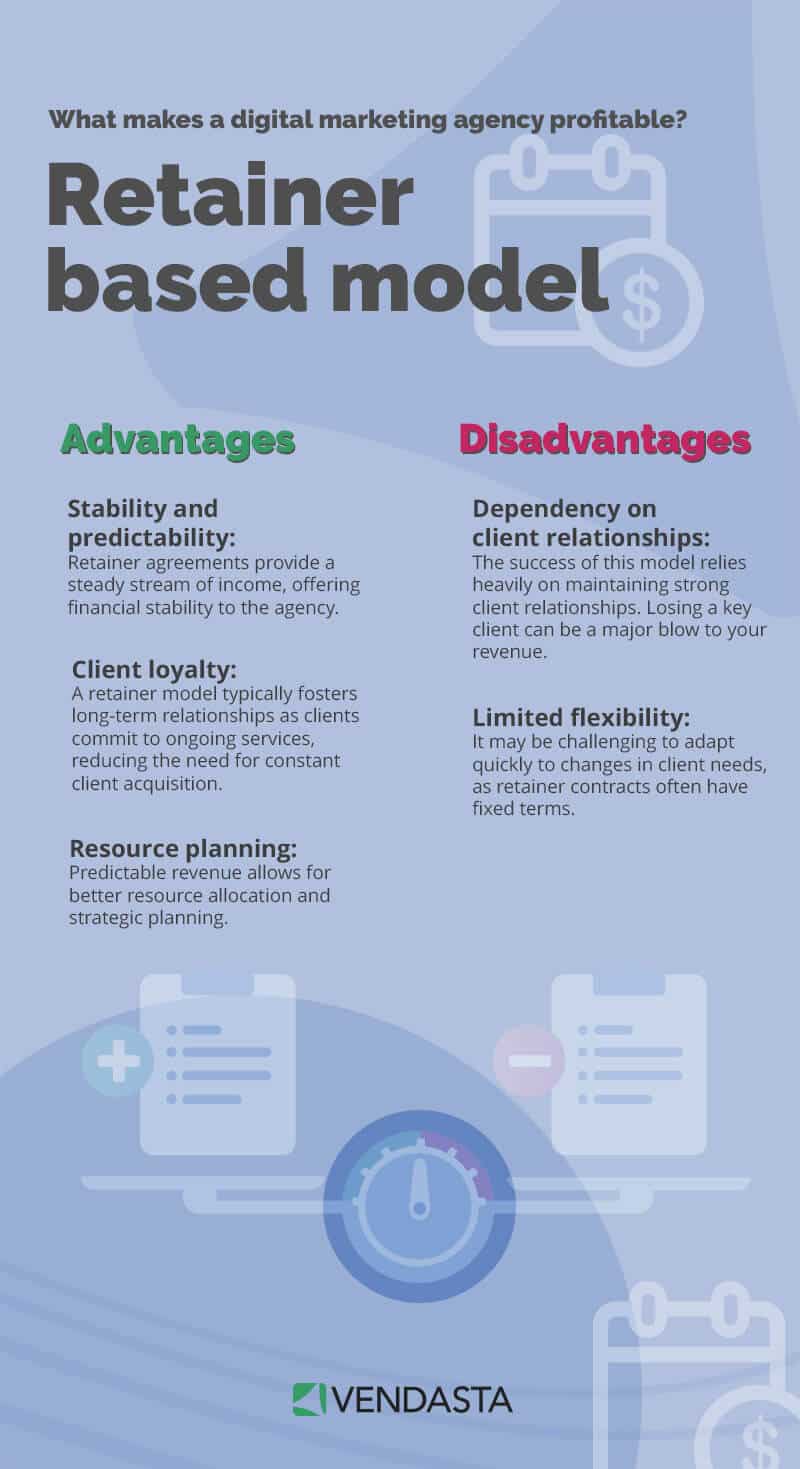
Advantages
- Stability and predictability: Retainer agreements provide a steady stream of income, offering financial stability to the agency.
- Client loyalty: A retainer model typically fosters long-term relationships as clients commit to ongoing services, reducing the need for constant client acquisition.
- Resource planning: Predictable revenue allows for better resource allocation and strategic planning.
Disadvantages
- Dependency on client relationships: The success of this model relies heavily on maintaining strong client relationships. Losing a key client can be a major blow to your revenue.
- Limited flexibility: It may be challenging to adapt quickly to changes in client needs, as retainer contracts often have fixed terms.
2. Project-based model
The project-based business model involves digital marketing agencies taking on specific, well-defined projects for clients. These projects can vary in scope, duration, and objectives. Agencies typically charge clients based on the project’s requirements, delivering the agreed-upon services within a defined timeframe.
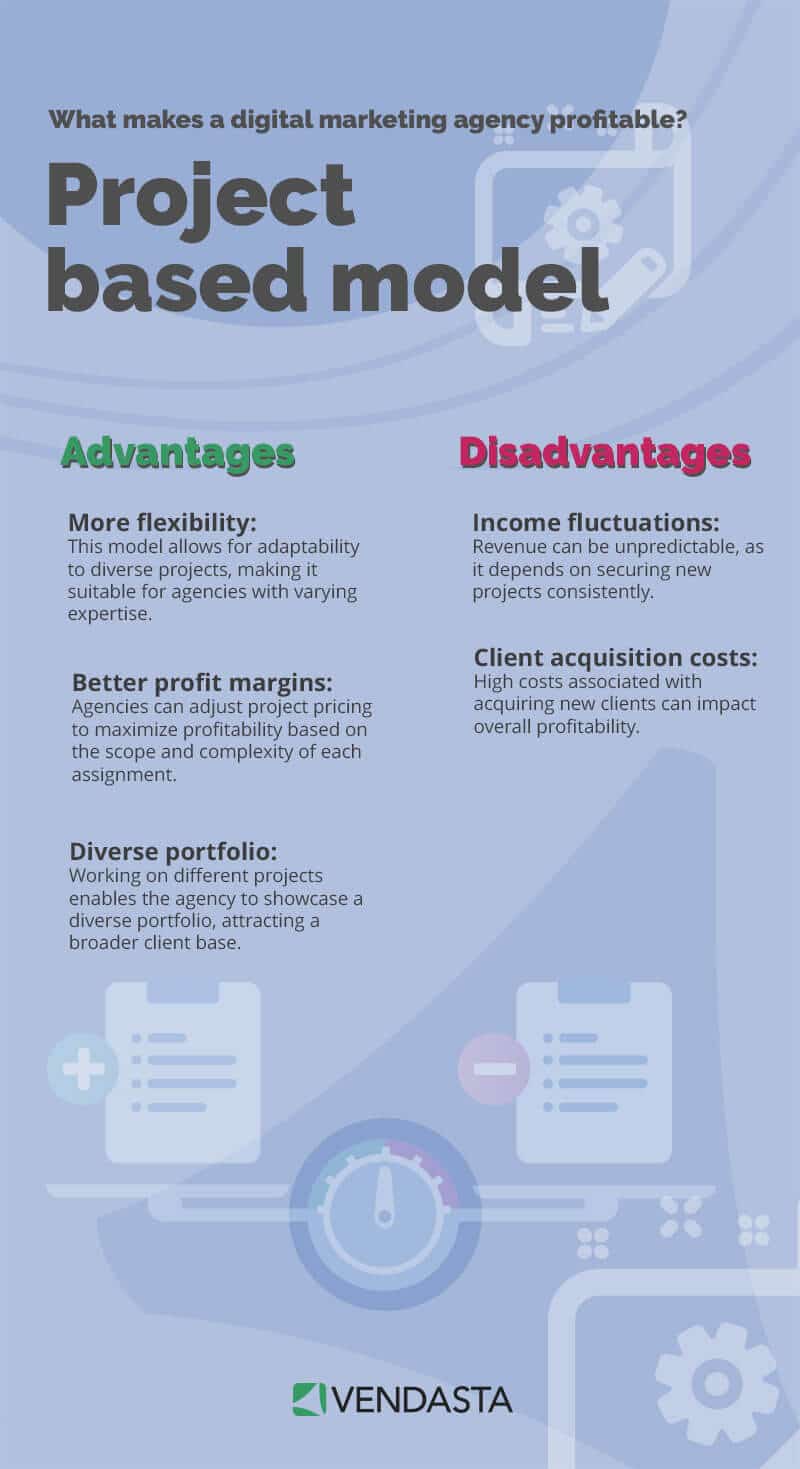
Advantages
- More flexibility: This model allows for adaptability to diverse projects, making it suitable for agencies with varying expertise.
- Better profit margins: Agencies can adjust project pricing to maximize profitability based on the scope and complexity of each assignment.
- Diverse portfolio: Working on different projects enables the agency to showcase a diverse portfolio, attracting a broader client base.
Disadvantages
- Income fluctuations: Revenue can be unpredictable, as it depends on securing new projects consistently.
- Client acquisition costs: High costs associated with acquiring new clients can impact overall profitability.
3. Performance-based model
In a performance-based business model, a digital marketing agency ties its compensation directly to the results achieved for the client. This could involve key performance indicators (KPIs) such as increased website traffic, lead generation, or sales. The agency is rewarded based on the success of its marketing efforts, creating a results-driven partnership between the agency and the client.
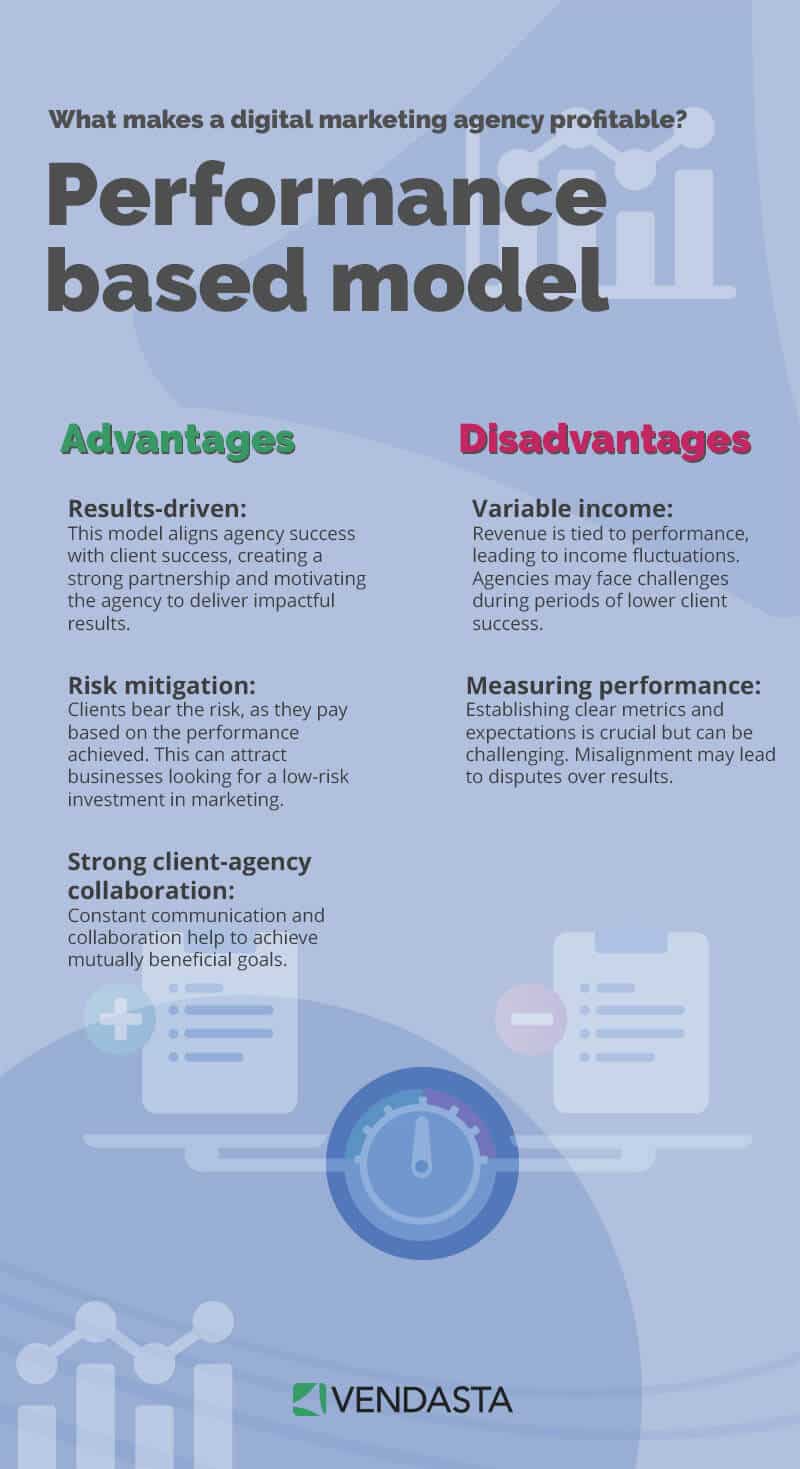
Advantages
- Results-driven: This model aligns agency success with client success, creating a strong partnership and motivating the agency to deliver impactful results.
- Risk mitigation: Clients bear the risk, as they pay based on the performance achieved. This can attract businesses looking for a low-risk investment in marketing.
- Strong client-agency collaboration: Constant communication and collaboration help to achieve mutually beneficial goals.
Disadvantages
- Variable income: Revenue is tied to performance, leading to income fluctuations. Agencies may face challenges during periods of lower client success.
- Measuring performance: Establishing clear metrics and expectations is crucial but can be challenging. Misalignment may lead to disputes over results.
Each agency business model has its own unique strengths and challenges. Making the right choice depends on the agency’s goals, strengths, and the nature of its client base. A well-balanced approach might involve a mix of these models or a hybrid strategy.
Ultimately, understanding the pros and cons of each model ensures you can make the most informed decisions for driving profitability for your digital agency.
Help your clients achieve visibility in local search
Get the comprehensive guide: How to conquer local search engine optimization today
![]() SECTION FOUR
SECTION FOUR
How has AI changed the digital marketing industry?

...Technology is often overestimated in the short run but drastically underestimated in the long run. I think we are at that inflection point where AI is going to change everything.”
—Brendan King, CEO of Vendasta

Artificial Intelligence (AI) has brought a revolution to the digital marketing landscape, reshaping strategies, workflows, and overall industry dynamics. Here’s a breakdown of how AI technologies have left an unforgettable mark on digital marketing:
Enhanced decision-making
AI enables data-driven decision-making like nothing we’ve ever seen before. By using AI to analyze vast amounts of datasets quickly, marketers are better able to understand customer behaviors, preferences, and trends. This insight helps guide better, more strategic decisions, ensuring marketing efforts are targeted and highly personalized.
Personalization at scale
Speaking of personalized, AI empowers marketers to create uniquely customized experiences for individual consumers in a way that can be feasibly scaled. From personalized recommendations to hyper-local content, AI algorithms analyze user data to deliver media that better resonates with specific audiences, hopefully leading to more clicks and more of that sweet, sweet cash.
Chatbots and customer interaction
Chatbots, powered by AI, have become a major pillar in customer interactions. Today, people want things instantly—including answers to their burning questions. AI is great for this because it provides lightning-fast responses to queries, offers personalized recommendations, and can even simulate human-like conversations, which greatly enhances the user experience.
Think about how much value an AI chatbot could add to a dental clinic for example. What if a patient with a toothache is searching for your emergency phone number after regular office hours? Instead of wasting time searching, they can ask a chatbot, get an answer instantly, and be on their way to booking an appointment the next day for a checkup.
Predictive analytics
AI’s predictive analytics capabilities help marketers forecast trends, identify potential leads, and optimize campaign performance better and faster. By analyzing historical data, AI can easily predict future outcomes and guide your marketers in better allocating resources to maximize ROI.
Automation of repetitive tasks
Ah, automation—we’re here for it as long as it makes repetitive tasks non-existent. Routine and time-consuming tasks can now be automated using AI, freeing up valuable time for marketers. Whether it’s scheduling social media posts, analyzing campaign performance, or segmenting audiences, automation streamlines your workflows, allowing you and your team to more closely focus on more important tasks.
Programmatic advertising
AI-driven advertising automates the buying and placement of ads in real time. Through algorithms, it evaluates user behavior and adjusts bid strategies, ensuring that ads are displayed to the most relevant audiences, optimizing ad spend, and increasing efficiency.
Also see: What is a digital marketing framework? And why you need one
Examples of AI tools in digital marketing
Here are some examples of AI tools that you might already be encountering out there in the wild:
1. Google Smart Bidding
AI-powered bidding strategies optimize bids for conversions or conversion value in each auction. One of the great things about it is that it improves campaign performance by automatically adjusting bids in real time based on significant factors.
2. Salesforce’s Einstein
It is an AI layer embedded in Salesforce CRM, providing insights, predictions, and recommendations. One of the cool things about Einstein and other similar models is that they enhance customer relationship management by offering personalized insights and automating tasks.
3. ChatGPT
One of the most well-known examples on the internet, ChatGPT by OpenAI, is an AI-powered language model designed for creating conversational agents and chatbots. Its easy-to-use chat function has been utilized for countless applications, from writing blogs to designing code, making It a versatile tool for speeding up content generation.
4. Adobe Sensei
This is an AI and machine learning framework embedded in Adobe’s suite of products.
One of the cool things about Adobe Sensei is its application for creative and marketing workflows by automating tasks like image recognition, personalization, and content recommendations.
5. Vendasta’s Social Marketing
With Vendasta’s Social Marketing AI, businesses can unlock a new level of efficiency, creativity, and customer engagement. From seamless content creation to automated customer service, AI enhances social media strategies and elevates the overall digital presence of your clients.
Here are some neat things your clients can do with Social Marketing’s AI tools:
- Single-prompt social media campaigns: The AI can turn a single prompt into a comprehensive social media campaign without needing extensive manual input.
- Craft unique text and imagery: Now you can use AI to craft unique and engaging content and images and bid farewell to manual content planning! Vendasta’s AI generates content calendars and can even schedule posts across multiple platforms to maintain a consistent online presence.
- Automated customer service: Use AI to promptly and effectively respond to customer interactions without missing a beat using the auto-generated prompts that appear.
- Location-specific AI content: Generate content for one, some, or all of your client’s locations using a single app. The AI allows you to tailor content to specific locations, ensuring relevance and a more local appeal.
AI has instantly become an integral part of the digital marketing toolkit, driving efficiency, personalization, and data-driven decision-making for countless agencies and businesses alike. As technology continues evolving, AI’s future in shaping the digital marketing industry looks bright, and we’re excited to see where it takes us next.
Work smarter, not harder
Build smart automations to trigger and automate your lead generation efforts, retention motins, and growth actions.
![]() SECTION FIVE
SECTION FIVE
Challenges of starting a digital marketing agency
Starting a digital marketing agency can be exhilarating, but it also comes with its own set of challenges. Here are some common hurdles you might encounter and effective strategies to overcome them:
Fierce competition
Just like any in-demand industry, the digital marketing space is crowded, making it challenging for new agencies to stand out from their more established competitors.
Recommended strategy: Start by differentiating your agency by specializing in a niche. Whether it’s a specific industry, type of service, or target audience, carving out a unique space for yourself can help you attract clients looking for specialized expertise they can’t find anywhere else.
Attracting clients
Getting those first few clients can be tough, especially when you’re just starting out.
Recommended strategy: If you’re having difficulty securing clients, leverage your network and offer initial services at a discounted rate or as a pilot project. If you have past clients from other opportunities or ventures, reach out and collect testimonials and design case studies to build up your credibility.
It also never hurts to roll up your sleeves and invest in developing a robust online presence. You’re already a whiz at what you do, so utilize your extensive digital marketing know-how for further self-promotion.
Falling behind on industry trends
The digital marketing landscape is constantly changing, and staying current with things like AI, algorithm preferences, and consumer tastes can be a lot to juggle.
Recommended strategy: Dedicate some time each month for continuous learning. Attend industry conferences, webinars, and workshops. Follow influential figures in digital marketing, subscribe to industry publications, and engage in online communities. This ongoing education will keep you informed and give your agency a competitive edge.
Technology overload
The myriad of digital marketing tools available to you can be overwhelming, and choosing the right ones for your team can be a daunting task. With different bells and whistles, pricing structures, hardware requirements, and employee preferences, there is a lot to consider when finding the right tools for the job.
Recommended strategy: It’s always best to start small and focus on the basics. As your agency grows, invest in more advanced tools. Utilize free trials as much as possible to test things out, and if you are on the fence, seek recommendations from industry peers to find the tech that is actually worth your time. Regularly reassess your toolset to ensure it aligns with your agency’s evolving needs. Is there a tool you are paying for that the team has stopped using? It might be time to cut the cord.
Pro tip: While it might be tempting to sign up for a 12-month subscription to take advantage of the discount, it could actually save you—in the long run—to try a free trial of software or go month-to-month to see if it is a good fit before you fully commit. Nothing is worse than being stuck paying for a program you don’t like when the money could have been better spent on another tool.
Growing pains
Scaling a digital marketing agency requires strategic planning and resource management. Without it, team productivity and company culture can get caught in the crossfire.
Recommended strategy: Begin with a focus on quality over quantity. As you gain clients and build a reputation, you can start to gradually expand your team and services. Consider strategic partnerships or collaborations to broaden your agency’s capabilities without immediate full-scale hiring that could overwhelm the agency.
Poor client retention
Retaining clients in a competitive environment can be just as challenging as acquiring them in the first place. While losing a client or two every once in a while is completely normal, for a business agency startup that may only have a handful of clients, it can have a major impact.
Recommended strategy: Prioritize customer satisfaction. Regularly communicate with clients, exceed expectations, and adapt your strategies based on their evolving needs. Offer loyalty incentives and continually demonstrate the value your agency brings to their business.
One other thing we want to note is that, while unfortunate, sometimes a partnership is just not a good fit. As digital agencies, we can’t please everyone, so be discerning about the type of clients you bring on from the get-go. The better the fit with your values, offerings, and expectations, the less likely you are to have churn.
Financial constraints
When you are first starting, the only income you might be working with is the money you and your partners have invested in the venture. With such a finite resource, managing every dollar is important, especially in the initial stages of your digital marketing journey.
Recommended strategy: Develop a detailed business plan, including financial projections. Monitor cash flow closely and set aside funds for unforeseen circumstances. Consider seeking advice from financial experts or mentors to ensure your agency’s finances stay stable.
Starting a digital marketing agency is undoubtedly demanding, but with a clear strategy, continuous learning, and a resilient mindset, these challenges can be transformed into opportunities for growth. Embrace the journey, learn from your mistakes, and adapt as needed to thrive in the unpredictable digital marketing industry.
Challenges Agencies Face
A guide to the challenges agencies are up against on the journey to scaling their business and how to solve them.
![]() SECTION SIX
SECTION SIX
Tools you need to start a digital marketing agency
In this section, we’ll lay the groundwork for finding the tools you need to run a successful digital marketing agency.
1. Website and portfolio
Design a professional website
Designing a polished agency website is the first step in getting your digital marketing company off the ground. Invest in a professional website that not only showcases your services but also reflects the key value of your agency. After all, if you don’t have a good website, how can you expect future clients to purchase a website from you?
Create a dedicated portfolio section
Have previous work in your back pocket? Highlight past success stories, case studies, and client testimonials. Let your work do the heavy lifting because good quality work can often speak for itself.
If you don’t have any previous work because you’re a pretty new agency, still create the section but hide it until you do have success stories to share—and you will have them.
Essential tools
- Professional Website: WordPress, Squarespace, or Wix.
- Dedicated Portfolio Section: Showcase and other plugins for WordPress or Behance.
2. Analytics and tracking tools
Website analytics tools
Tools like Google Analytics are great tools for tracking and optimizing your online presence. It better allows you to dive deep into the effectiveness of your SEO efforts, pinpointing successful keywords, and helping you to better optimize your content strategy. Gain a holistic view of your website traffic, understanding user demographics and traffic sources to fine-tune marketing strategies and resource allocation.
On the user experience front, Google Analytics also provides valuable insights into page interactions and conversions. It gives you a clearer picture of how users engage with your site, identifies the most popular content, and shows you areas that need improvement.
Social media analytics
Platforms like Meta Insights and LinkedIn Analytics provide invaluable insights into the effectiveness of your social media strategies, offering a deeper look into metrics Google Analytics 4 might not be able to supply, such as propriety platform metrics like view-through rates on videos, and how many clicks a user made during a session. Each analytics platform uses its own way of tracking users, which means data may contradict itself on one versus the other. This is why it can be beneficial to track one metric in one place, and other metrics in another to glean the best insights.
Essential tools
- Website analytics tools: Google Analytics.
- Social Media Analytics: Meta Insights, LinkedIn Analytics, X Analytics and more.
3. Project management software
Organization tools
Save yourself the headache and keep projects organized from the get-go. Organizational tools like Task Manager can help you better assign tasks, set deadlines, and streamline communication among team members to improve productivity.
Collaboration tools
Projects go much smoother when everyone is in the loop. Platforms like Google Workspace facilitate real-time communication, fostering a collaborative work environment that is agile enough to tackle problems before they can become blockers.
Essential tools
- Organization Tools: Vendasta Task Manager, Asana, Trello, or Monday.com.
- Collaboration Tools: Google Workspace or Microsoft Teams.
4. Graphic design and content creation tools
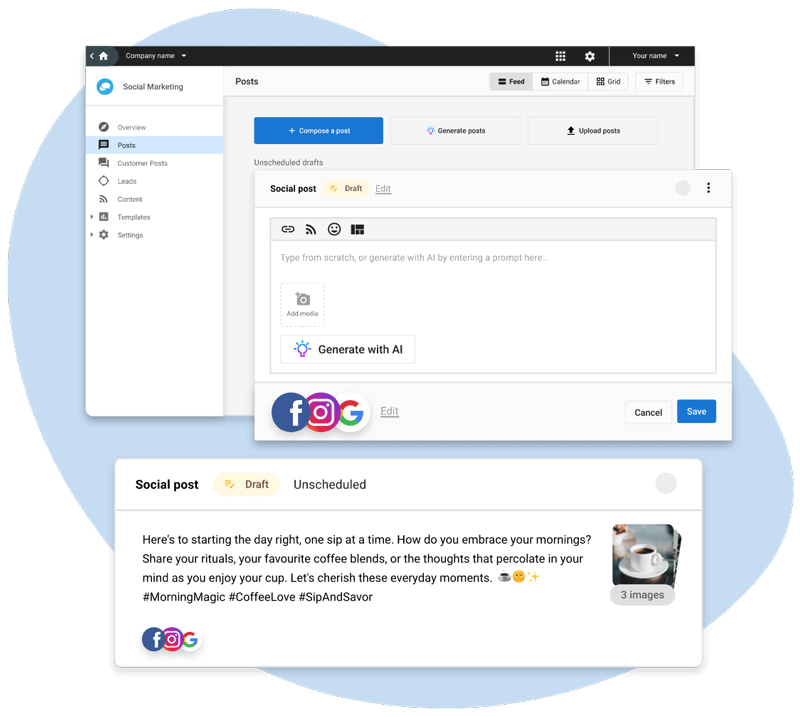
When it comes to choosing between graphic design tools or online design platforms, considerations like your agency’s experience level, budget, and skill set play an important role.
For those newer to the field or with budget constraints, online design platforms can offer user-friendly interfaces and pre-designed templates, streamlining the design process. However, as your agency grows and demands more sophisticated designs, transitioning to industry-standard tools like Photoshop, Illustrator, and InDesign becomes a strategic move.
These professional-grade tools provide more flexibility and advanced features, empowering your team to create unique designs tailored to your client’s needs. Ultimately, the choice between investing in graphic design tools or subscribing to online platforms hinges on finding the right balance that aligns with your agency’s current requirements and future aspirations.
Graphic design tools
A no-brainer for professional-grade graphic designs. Photoshop, Illustrator, and InDesign are the industry standards.
Online design platform tools
Canva, for example, is an online platform that is easy to use and ideal for quick design solutions, particularly for social media graphics, simple visuals, and infographics.
Essential tools
- Graphic design tools: Photoshop, Illustrator, and InDesign.
- Online design platform tools: Canva or Piktochart.
5. Email marketing platform
Email marketing tools
As you grow your digital agency, it’s time to manage email campaigns more efficiently as you drum up more and more leads. From newsletters to automated drip campaigns, platforms like Vendasta offer versatile solutions.
Essential tools
- Email Marketing Tools: Vendasta, Broadly, Mailchimp, and Constant Contact among others.
6. Ad accounts and budgets
Ads management tools
Set up ad accounts on platforms like Google and Meta for effective paid advertising. These tools allow you to more easily allocate digital marketing budgets so they can be strategically based on your campaign goals.
Budget tracking tools
Implement tools to monitor and analyze ad spending against performance metrics so you are not wasting precious resources.
Essential tools
101 FREE Tools for Digital Marketers
![]() SECTION SEVEN
SECTION SEVEN
How to start a digital marketing agency in 10 steps
1. Define your niche and target market
Finding your niche
Whether it’s focusing on social media management, SEO, content creation, or a unique combination of services, clearly defining your niche allows your boutique marketing agency to showcase its unique offerings in your marketing ecosystem. This not only helps you stand out from the competition but also makes it easier for potential clients to understand the core expertise of your agency.
The importance of niche selection
By concentrating your efforts on a specific niche, you can deepen your knowledge, refine your skills, and tailor your services to meet the distinct needs of that niche. Sharpening your skills in this one area positions your agency as an expert, attracting clients looking for specialized help they can’t find through a one-stop-shop agency.
The benefits of targeting a specific audience
Targeting a specific demographic or industry brings a myriad of benefits to your agency. First and foremost, it improves service quality.
By catering to a particular market, you can fine-tune your strategies, stay updated on industry trends, and provide solutions tailored to the unique challenges of that sector. This focused approach enhances your agency’s effectiveness and builds a reputation for delivering specialized, high-quality services.
On top of this, you can offer your marketing consulting services at a premium. Specializing in a complex niche that requires a lot of investment from your agency—such as medicine, politics, and law—warrants a higher price tag.
Tips for identifying your target market
Identifying your target market is a crucial step in the specialization process. Start by conducting thorough research to understand the needs, pain points, and preferences of potential clients within your chosen niche. From there, analyze your competition to identify gaps and opportunities. Collecting insights about your target audience’s behaviors and current challenges will be the foundation for creating a marketing message that really hits home.
Understanding their needs
To truly specialize, you must fully understand the needs of your target market. Dive deep into the specific challenges they face and the goals they aim to achieve—however, understanding your target market will take more than a simple Google search.
Some methods likke conducting surveys, interviews, or performing a market analysis can help you get these comprehensive insights. Not only can they help you better shape your service offerings, but they also position your agency as a valuable partner that comprehensively addresses the unique needs of your chosen niche.
2. Conduct market research and competitor analysis
Becoming a successful digital marketing agency requires more than just intuition—it demands strategic awareness of your surroundings. That’s where Market research comes in.
Market research is the foundation which informed decisions, effective strategies, and successful differentiation are solidly built. By thoroughly understanding the market you plan to do business in, you‘ll gain insights into your competitors, evolving trends, service gaps, and untapped opportunities just ripe for the picking.
The Role of competitor analysis in identifying gaps and opportunities
Competitor analysis is a key component of market research that reveals the intricacies of your competitive landscape. Through a comprehensive SWOT analysis—evaluating strengths, weaknesses, opportunities, and threats—you gain a detailed understanding of your agency’s position in comparison to others around you.
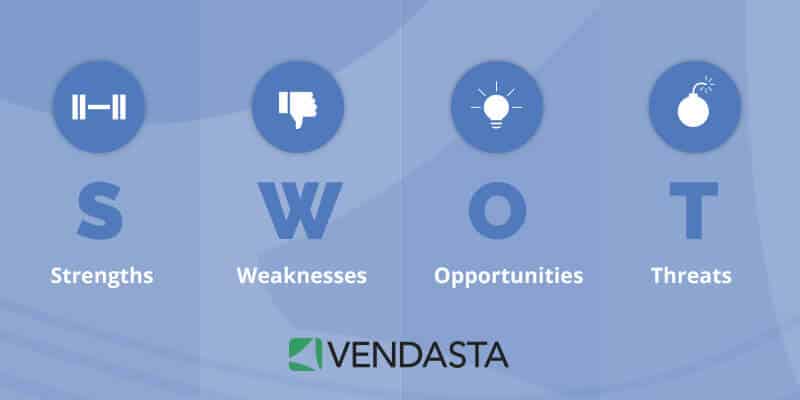
This helps you identify areas where your agency excels but also highlights places you might be unaware you currently fall short. Even more importantly, it allows you to identify opportunities that competitors may have overlooked, allowing you to differentiate yourself.
6 strategies for conducting effective market research and competitor analysis
- Identify market trends: Stay ahead by tracking evolving market trends. Leverage industry reports, online publications, and insights from thought leaders to understand where the digital marketing landscape is heading.
- Spot service gaps: Conduct thorough research to identify service gaps within your chosen niche. Engage with potential clients, gather feedback from current customers, and pinpoint areas where existing agencies may be falling short in meeting their clients’ needs.
- Sniff out potential opportunities: Opportunities often hide in plain sight. Regularly reassess your market, looking for emerging needs, technological advancements, or shifts in client preferences that may open doors for your agency.
- Effective competitor research: Utilize your SWOT analysis to comprehensively evaluate your direct competitors. Identify their strengths and weaknesses, understand the opportunities they might be missing, and be aware of potential threats to your agency. Pay close attention to who you compare yourself to. We regularly overlook the smaller guys that might be lurking just out of sight.
- Differentiate your agency: Armed with the insights you gathered from your market research and competitor analysis, it’s time to position your agency to stand out. Emphasize your strengths, address your weaknesses, capitalize on opportunities, and find what makes your agency different.
- Stay agile and informed: Market dynamics are always shifting and evolving. Establish a system for continuous market monitoring, ensuring your agency remains agile and responsive to shifts in trends, client preferences, and competition.
By approaching market research and competitor analysis the smart way, you stand to gain from the insights they present to you. So keep your eyes peeled, your ears to the ground, and your fingers on the pulse of your market to avoid any unwelcome surprises.
3. Develop a comprehensive business plan
Starting a digital marketing agency is exciting, but for it to succeed, you need a roadmap that will take you where you want to go—that’s where a business plan can come in handy.
Why you need a good business plan
Your business plan is your guide. It’s not just for getting loans or funding from investors—it’s the building blocks that make up your agency’s identity. It tells people what your agency is all about, where you’re going, and how you plan to scale it. Having a clear, well-thought-out plan helps when you are at a crossroads, enabling you to make the smart decisions that keep you on the right track.
Key parts of your business plan
- Business overview: Sum up your agency, mission, and values.
- About your business: This is where you can share more about your agency—its background, vision, and the services you’ll offer. Be clear on your niche and target customers.
- Identifying your market: Always consider the current digital marketing landscape. What’s trending? Are there gaps or opportunities you want to highlight? Look at other agencies and see where you can make yourself shine.
- Your team and operations: Talk about your team structure, your talent, and the skill sets they bring to the table. Include mention of your current location, list of assets, and any partnerships you’ve made.
- Services you offer: Clearly list what your agency does and explain what makes it unique.
- How you’ll get clients: Outline your plan for finding clients and promoting your services. Set your prices and describe in detail the marketing plan you intend to use to help you sell.
- Financials: If you need funding, say how much and what you’ll use it for. Make realistic money forecasts to show investors you did your homework.
Tips for a good business plan
- Use good quality info: Do your research and use real data. It strengthens your case and shows people you know what you’re doing.
- Be realistic and flexible: Don’t get overly ambitious. Now is the time to make realistic goals and plans. Also, be ready to change things up if needed.
- Be crystal clear: Avoid being vague. Be clear about your audience, plans, and money matters. It makes your plan more transparent and believable.
- Check and make changes: Your business plan isn’t permanent—review and make changes to it often to keep its contents relevant and realistic.
A strong business plan gives your digital marketing agency a solid foundation, allowing it to grow faster and achieve better results. If there is one place you shouldn’t skimp, it should definitely not be your business plan.
Pro tip: Keep your business plan concise. It should take no longer than 10-15 minutes for someone to parse through. Some great ways you can improve your business plan is by incorporating bullet point lists, charts, and graphics to keep the reader engaged.
While there’s no industry standard for creating a business plan, shorter is always better. An average business plan can range from a few paragraphs to over 100 pages. Try to aim for 15 pages to start with (BDC).
4. Register your agency and establish a legal structure
Navigating the legal side of things might seem daunting, especially while starting. However, understanding a few key steps can make the process a lot smoother.
Choosing your legal structure
Decide how you want your agency legally structured. Common options include a sole proprietorship, partnership, and corporation. Each has its pros and cons, so consider factors like liability protection and taxation implications before setting out in one way or another.

Registering your business
Once you’ve chosen a structure, register your business with the necessary authorities. This step formalizes your agency and is often a legal requirement.
Dealing with taxes and licenses
Understanding your tax obligations and obtaining the required licenses is not only a good thing to do—it is the law. The requirements can vary based on your location and the services you offer, but in most cases, you will need at least the following:
- Tax Identification Number: Obtain a tax ID number. This will be essential for tax purposes and business transactions.
- Licenses: Check local regulations for any industry-specific licenses you might need.
Remember, compliance with legal obligations ensures a smooth journey for your digital marketing agency. Taking these steps early on saves you from major headaches down the road and sets a good foundation for your budding business.
5. Build a talented team with diverse skill sets
Building a skilled and diverse team is the beating heart of any successful digital marketing agency. Recognizing the importance of this step can make or break your venture entirely.
Here’s what you need to know to start things off right:
Why a talented and diverse team matters
Having a team with diverse skill sets brings a wealth of perspectives and capabilities to your business. When you pair your agency with a diverse range of talent, you form a dream team that is worth more than the sum of its parts. What does this all mean? It means better team cohesion, better productivity, and better client outcomes. It’s a win-win.
Key roles and skills your agency needs
Understanding the roles crucial for your agency helps you target the right people for recruitment. Essential positions that you should add to your roster may include:
- Digital strategists: experts in planning and executing digital marketing strategies.
- Content creators: skilled writers, graphic designers, and video creators who produce compelling and eye-catching content.
- SEO specialists: professionals focused on optimizing digital content for search engines.
- Website designers: technical IT experts who design, build, and manage websites.
Recruiting, training, and retaining talent
It’s not just getting talent through the door—you need to keep them there too. Here’s what you need to know to retain and grow your talent:
- Recruitment: Look for individuals whose skills align with your agency’s needs. Leverage online platforms, your network, and industry events for the most effective recruitment channels.
- Training: Invest in continuous training to keep your team abreast of industry trends and evolving technologies. This ensures your agency always remains competitive.
- Retention: Create a positive work environment, offer growth opportunities, and recognize achievements. This contributes to employee satisfaction and a long-term commitment to your digital marketing agency.
Starting small and growing smart
Begin with a lean team. If you’re just starting out, you might be the sole operator or work with a small, versatile team. Scale strategically as your client base expands, aligning hires with increasing workloads and demand.
Remember, your team is the backbone of your agency. Prioritize wisely, invest in growth, and watch your digital marketing team take you places you never thought possible.
6. Invest in essential tools and technologies for digital marketing
Setting up your digital marketing agency for success means having the right tools in your arsenal. Here’s a simple guide to get you started:
Create a productive workspace
Make sure your work environment is comfy and has what your team needs. Think ergonomic chairs, office supplies, and a solid internet connection.
Invest in digital tools
Every good business needs its gadgets, and for a digital marketing agency, these tools of the trade are essential:
- Analytics tools: These help you understand your target audience’s behavior online. Google Analytics is a popular one, giving you insights into your website traffic and campaign success.
- Project management tools: Keep everything organized. Tools like these can help you assign tasks, set deadlines, and collaborate with your team.
- Design tools: They just make things look so good. Photoshop and Illustrator are perfect for complex projects, while Canva is a great companion for quick and easy visuals.
Why advanced tools matter
For the most part, higher-end project management, design, and analytics tracking tools carry a hefty price tag for a reason—they’re excellent at what they do.
Advanced tools automate repetitive tasks, help you make smarter decisions for your business, allow your team to work better together, and can even track trends and make predictions for future project strategies.
For many, these tools are worth it because they make doing your job easier and help you produce even better results.
Picking your tools wisely
Choose tools based on what your agency needs day-to-day. While some added bells and whistles would be nice to have, at the beginning, it’s most important to consider your budget and find the best value for the essentials your team needs.
7. Create a compelling portfolio and establish credibility
In the highly competitive digital marketing space, a portfolio is more important than ever to win over clients.
Why a portfolio matters
Your portfolio acts as your online trophy room. It showcases your best work and proves to potential clients that you’ve got the skills they’re looking for. If you’re ready to knock your prospects’ socks off, here’s your guide on how to make your portfolio extraordinary:
Elements of a standout portfolio
- Showcase diverse work: Include a variety of projects to demonstrate your range. Whether it’s social media management, content marketing, or SEO, it is a good idea to display your versatility.
- Highlight success stories: Don’t just tell what you did—show your prospects how it made a difference. Did you boost sales, increase engagement, or help a brand identity shine? Make sure the impact you left on your client is crystal clear.
- Organize by date: Your most recent work should always come first, with previous work following close behind to showcase the progress your agency’s made over the years.
Tips for building your portfolio
- Quality over quantity: It’s not about having many projects, but showing the best.
- Keep it updated: Your portfolio should evolve with your skills by showcasing your latest and greatest work.
Credibility is key: Building trust is vital in designing a convincing portfolio. Add client testimonials, certifications, or any recognition you’ve received. You want your portfolio to scream, “I’m the one you’re looking for.”
8. Develop a pricing strategy and determine your service offerings
Trying to determine how to price your service offerings? Here are some things to consider:
Know your worth
Factor in your expertise, industry standards, and the unique value you deliver. If outsourcing is part of the plan, ensure it’s also accounted for in your pricing.
Determine your pricing model
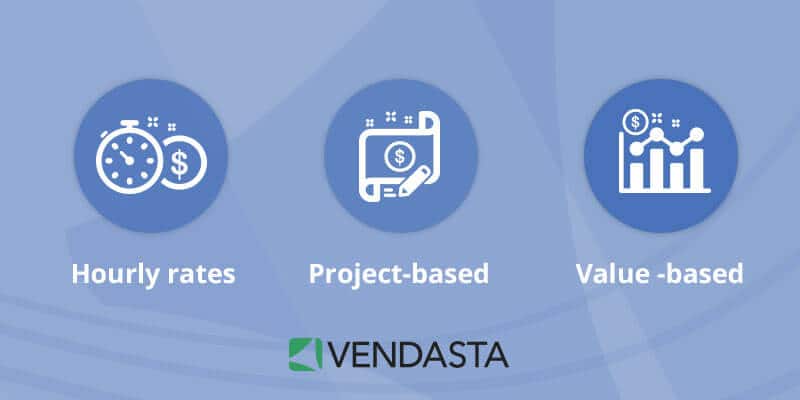
Some of the most common pricing models are:
- Hourly rates: Great for projects with variable workloads. This model allows you to calculate the time invested and charge accordingly.
- Project-based: Ideal for well-defined tasks. The ability to set a flat fee for the entire project makes tracking financials much easier.
- Value-based: This model aligns with the impact of your services on client outcomes, and you’ll charge based on the value you deliver.
Design your service packages
There are a few different ways you can approach designing your service packages. From a tiered service model (for budget-conscious clients) to a theme around a specific range of services. They can even be geared towards smaller businesses, larger businesses, merchants, or restaurants.
Whatever you decide to do, make sure that the packages you create are tailored to each client to meet their very specific needs. Communication is also key, so ensure your clients understand what they’re getting with each package. Clearly outline what each package entails to avoid any confusion or frustration.
9. Implement effective marketing and lead generation strategies
Unlock opportunities through networking
Building your agency’s presence starts with networking. Attend industry events, join professional networks, and engage with peers on forums. These connections help you gain referrals while building lasting partnerships.
Digital marketing
You work hard to promote others—now it’s time to promote yourself. Utilize social media platforms such as LinkedIn, Twitter, and Facebook to showcase your expertise. A solid content marketing strategy, including high-quality blogs, videos, and infographics, can set you apart as an industry leader. You can also implement targeted email campaigns to keep your audience informed about your services and special offerings.
Lead generation
Crafting a compelling sales pitch and designing tailored business proposals are key elements of effective lead generation. Clearly articulate the unique value your agency can offer, addressing the specific solutions your client is searching for. This helps you showcase how your services can make a significant difference for them.
Client relationship building
Nourish strong relationships with your initial clients. Their satisfaction and feedback play a big role in shaping your agency’s long-term reputation. Check in with them regularly, and go the extra mile to keep them coming back.
10. Continuously learn and adapt to industry trends and changes
Stay curious and keep learning
In the unpredictable world of digital marketing, continuous learning is not just an option—it’s a necessity. Stay ahead by consistently updating your team’s skills and knowledge. This commitment to learning ensures you’re well-equipped to tackle any hurdle that comes your way.
Keep things flexible
By staying informed and adjusting strategies to align with shifts in the industry, you position your agency as an adaptable force within constant change. Focus on elevating your agency’s resilience through leading an agile and flexible culture, staying on top of the latest trends, and always having a backup plan.
How to start selling online in 60 minutes or less
Step-by-step, in-depth instructions to get you selling online in 60 minutes or less.
![]() SECTION EIGHT
SECTION EIGHT
Things to avoid when starting a digital marketing company
While it might be tempting to jump headfirst into starting your new venture, you need to avoid these common pitfalls:
Overpromising and underdelivering
While some enthusiasm doesn’t hurt, setting realistic expectations is equally important. Instead, create realistic expectations—it’s better to undersell and over-deliver sometimes than overpromising and underdelivering.
Undervaluing your work
Undercharging for services might seem like a quick strategy to attract clients, but it can harm your agency’s bottom line. After all, you’ve got bills to pay and employees who depend on you. Understand the value you provide and price accordingly. You should always consider the long-term financial health of your agency over short-term gains.
Neglecting ongoing communication
Effective client communication is the lifeblood of a digital marketing agency. Regular updates, progress reports, and client meetings build strong relationships. Neglecting this aspect can lead to confusion, misunderstandings, and dissatisfaction. Always prioritize clear, consistent communication.
Key takeaways
To build a thriving agency, focus on transparency, realistic goal-setting, and effective communication. Set clear expectations, price your services competitively, and nurture ongoing client relationships.
Market, sell, bill, and fufill all from one connected platform
Discover a new way to grow with the only end-to-end ecommerce platform for selling digital solutions to local businesses.
![]() SECTION NINE
SECTION NINE
Signs that starting a digital marketing agency is worth it for you
To gauge if it’s the right fit for you, consider the following self-assessment questions:
- Passion for digital marketing:
- Are you genuinely passionate about digital marketing?
- Do you enjoy staying updated on industry trends and emerging tech?
- Strong analytical skills:
- Are you comfortable analyzing data and drawing insights?
- Do you enjoy interpreting analytics to measure campaign success?
- Client-centric approach:
- Do you have a passion for meeting client needs?
- Can you effectively communicate complex digital strategies to clients in a way they understand?
- Resilience and adaptability:
- Are you resilient in the face of challenges and adaptable to change?
- Can you pivot your strategies based on limited information?
- Business acumen:
- Do you have a basic understanding of business principles already?
- Are you comfortable with financial management, pricing strategies, and business planning?
- Creative problem-solving:
- Is developing creative solutions for client challenges something that comes naturally to you?
- Are you open to experimenting with different approaches to achieve optimal results?
- Time management and discipline:
- Are you naturally disciplined in managing your time and meeting deadlines?
- Can you comfortably balance multiple projects and priorities effectively?
- Client relationship building
- Are you a people person and enjoy building and maintaining strong client relationships?
- Are you comfortable networking to generate leads and expand your clientele?
- Continuous learning mindset:
- Are you always hungry to learn something new?
- Can you embrace new ways of doing things with enthusiasm?
- Entrepreneurial spirit:
- Do you feel even more driven when prospects say “no?”
- Are you comfortable taking calculated risks for potential rewards?
If you find yourself aligning with these qualities, the journey of starting a digital marketing agency could be in the cards for you. Combine your skills with a passion for digital marketing, and you’ll be on a path to success.
![]() SECTION TEN
SECTION TEN
Conclusion
Starting a digital marketing agency is an exciting adventure. From finding your niche to crafting compelling marketing strategies, this guide has shown you the way to thriving in this unique industry. Today, more than ever, businesses need savvy marketers, and that could be you.
If you see yourself in the qualities we mentioned and feel the spark to dive in, starting your own digital marketing agency could be the right fit. It’s a journey filled with opportunities to shape brands, drive success, and contribute to business growth.
So, if you’re ready for the adventure, armed with passion and a commitment to learning, the digital marketing world is yours to conquer. Let now be where your journey begins.
How to reach peak profit potential
A definitive agency profitability playbook
About the author
Mary-Margaret Bennett is a Social Media Content Specialist at Vendasta, with a versatile background spanning business development, IT project management, and work as a writer and graphic designer across various industries. Outside of her professional endeavors, she enjoys birdwatching and crafting work for local art exhibitions.



